- Home
- George MacDonald
St. George and St. Michael Page 2
St. George and St. Michael Read online
Page 2
CHAPTER II.
RICHARD AND HIS FATHER.
Richard Heywood, as to bodily fashion, was a tall and already powerfulyouth. The clear brown of his complexion spoke of plentiful sunshine andair. A merry sparkle in the depths of his hazel eyes relieved theshadows of rather notably heavy lids, themselves heavilyoverbrowed--with a suggestion of character which had not yet asserteditself to those who knew him best. Correspondingly, his nose, althoughof a Greek type, was more notable for substance than clearness of lineor modelling; while his lips had a boyish fulness along with adefiniteness of bow-like curve, which manly resolve had not yet begun tocompress and straighten out. His chin was at least large enough not tocontradict the promise of his face; his shoulders were square, and hischest and limbs well developed: altogether it was at present a fairtabernacle--of whatever sort the indwelling divinity might yet turn out,fashioning it further after his own nature.
His father and he were the only male descendants of an old Monmouthshirefamily, of neither Welsh nor Norman, but as pure Saxon blood as might behad within the clip of the ocean. Roger, the father, had once only ortwice in his lifetime been heard boast, in humorous fashion, thatalthough but a simple squire, he could, on this side the fog oftradition, which nearer or further shrouds all origin, count a longerdescent than any of the titled families in the county, not excluding theearl of Worcester himself. His character also would have gone far tosupport any assertion he might have chosen to make as to the purity ofhis strain. A notable immobility of nature--his friends called itfirmness, his enemies obstinacy; a seeming disregard of what othersmight think of him; a certain sternness of manner--an unreadiness, as itwere, to open his door to the people about him; a searching regard withwhich he was wont to peruse the face of anyone holding talk with him,when he seemed always to give heed to the looks rather than the words ofhim who spoke; these peculiarities had combined to produce a certain aweof him in his inferiors, and a dislike, not unavowed, in his equals.With his superiors he came seldom in contact, and to them his behaviourwas still more distant and unbending. But, although from these causes hewas far from being a favourite in the county, he was a man of such knownand acknowledged probity that, until of late, when party spirit ran highand drew almost everybody, whether of consequence or not, to one side orthe other, there was nobody who would not have trusted Roger Heywood tothe uttermost. Even now, foes as well as friends acknowledged that hewas to be depended upon; while his own son looked up to him with areverence that in some measure overshadowed his affection. Such acharacter as this had necessarily been slow in formation, and theopinions which had been modified by it and had reacted upon it, had beenas unalterably as deliberately adopted. But affairs had approached acrisis between king and parliament before one of his friends knew thatthere were in his mind any opinions upon them in process offormation--so reserved and monosyllabic had been his share in anyconversation upon topics which had for a long time been growing everyhour of more and more absorbing interest to all men either ofconsequence, intelligence, property, or adventure. At last, however, ithad become clear, to the great annoyance of not a few amongst hisneighbours, that Heywood's leanings were to the parliament. But he hadnever yet sought to influence his son in regard to the great questionsat issue.
His house was one of those ancient dwellings which have grown under thehands to fit the wants of successive generations, and look as if theyhad never been other than old; two-storied at most, and many-gabled,with marvellous accretions and projections, the haunts of yet morewonderful shadows. There, in a room he called his study, shabby andsmall, containing a library more notable for quality and selection thansize, Richard the next morning sought and found him.
'Father!' he said, entering with some haste after the usual request foradmission.
'I am here, my son,' answered Roger, without lifting his eyes from thesmall folio in which he was reading.
'I want to know, father, whether, when men differ, a man is bound totake a side.'
'Nay, Richard, but a man is bound NOT to take a side save upon reasonswell considered and found good.'
'It may be, father, if you had seen fit to send me to Oxford, I shouldhave been better able to judge now.'
'I had my reasons, son Richard. Readier, perhaps, you might have been,but fitter--no. Tell me what points you have in question.'
'That I can hardly say, sir. I only know there are points at issuebetwixt king and parliament which men appear to consider of mightiestconsequence. Will you tell me, father, why you have never instructed mein these affairs of church and state? I trust it is not because youcount me unworthy of your confidence.'
'Far from it, my son. My silence hath respect to thy hearing and to thejudgment yet unawakened in thee. Who would lay in the arms of a childthat which must crush him to the earth? Years did I take to meditate ereI resolved, and I know not yet if thou hast in thee the power ofmeditation.'
'At least, father, I could try to understand, if you would unfold yourmind.'
'When you know what the matters at issue are, my son,--that is, when youare able to ask me questions worthy of answer, I shall be ready toanswer thee, so far as my judgment will reach.'
'I thank you, father. In the meantime I am as one who knocks, and thedoor is not opened unto him.'
'Rather art thou as one who loiters on the door-step, and lifts upneither ring nor voice.'
'Surely, sir, I must first know the news.'
'Thou hast ears; keep them open. But at least you know, my son, that onthe twelfth day of May last my lord of Strafford lost his head.'
'Who took it from him, sir? King or parliament?'
'Even that might be made a question; but I answer, the High Court ofParliament, my son.'
'Was the judgment a right one or a wrong, sir? Did he deserve the doom?'
'Ah, there you put a question indeed! Many men say RIGHT, and many mensay WRONG. One man, I doubt me much, was wrong in the share HE boretherein.'
'Who was he, sir?'
'Nay, nay, I will not forestall thine own judgment. But, in good sooth,I might be more ready to speak my mind, were it not that I greatly doubtsome of those who cry loudest for liberty. I fear that had they once thepower, they would be the first to trample her under foot. Liberty withsome men means MY liberty to do, and THINE to suffer. But all in goodtime, my son! The dawn is nigh.'
'You will tell me at least, father, what is the bone of contention?'
'My son, where there is contention, a bone shall not fail. It is but aleg-bone now; it will be a rib to-morrow, and by and by doubtless itwill be the skull itself.'
'If you care for none of these things, sir, will not master Flowerdewhave a hard name for you? I know not what it means, but it sounds of thegallows,' said Richard, looking rather doubtful as to how his fathermight take it.
'Possibly, my son, I care more for the contention than the bone, forwhile thieves quarrel honest men go their own ways. But what ignorance Ihave kept thee in, and yet left thee to bear the reproach of a puritan!'said the father, smiling grimly. 'Thou meanest master Flowerdew wouldcall me a Gallio, and thou takest the Roman proconsul for agallows-bird! Verily thou art not destined to prolong the renown of thyrace for letters. I marvel what thy cousin Thomas would say to thedarkness of thy ignorance.'
'See what comes of not sending me to Oxford, sir: I know not who is mycousin Thomas.'
'A man both of learning and wisdom, my son, though I fear me his diet istoo strong for the stomach of this degenerate age, while the dressing ofhis dishes is, on the other hand, too cunningly devised for theirliking. But it is no marvel thou shouldest be ignorant of him, being asyet no reader of books. Neither is he a close kinsman, being of theLincolnshire branch of the Heywoods.'
'Now I know whom you mean, sir; but I thought he was a writer of stageplays, and such things as on all sides I hear called foolish, andmummery.'
'There be among those who call themselves the godly, who will endure nomummery but of their own inventing. Cousin Thomas hath written a
multitude of plays, but that he studied at Cambridge, and to goodpurpose, this book, which I was reading when you entered, bears goodwitness.'
'What is the book, father?'
'Stay, I will read thee a portion. The greater part is of learningrather than wisdom--the gathered opinions of the wise and goodconcerning things both high and strange; but I will read thee someverses bearing his own mind, which is indeed worthy to be set down withtheirs.'
He read that wonderful poem ending the second Book of the Hierarchy, andhaving finished it looked at his son.
'I do not understand it, sir,' said Richard.
'I did not expect you would,' returned his father. 'Here, take the book,and read for thyself. If light should dawn upon the page, as thoureadest, perhaps thou wilt understand what I now say--that I care butlittle for the bones concerning which king and parliament contend, but Ido care that men--thou and I, my son--should be free to walk in any pathwhereon it may please God to draw us. Take the book, my son, and readagain. But read no farther save with caution, for it dealeth with manythings wherein old Thomas is too readily satisfied with hearsay fortestimony.'
Richard took the small folio and carried it to his own chamber, where heread and partly understood the poem. But he was not ripe enough eitherin philosophy or religion for such meditations. Having executed histask, for as such he regarded it, he turned to look through the strangemixture of wisdom and credulity composing the volume. One tale afteranother, of witch, and demon, and magician, firmly believed and honestlyrecorded by his worthy relative, drew him on, until he sat forgetful ofeverything but the world of marvels before him--to none of which,however, did he accord a wider credence than sprung from the interest ofthe moment. He was roused by a noise of quarrel in the farmyard, towardswhich his window looked, and, laying aside reading, hastened out tolearn the cause.

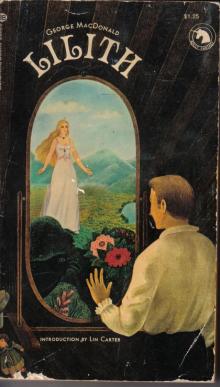 Lilith: A Romance
Lilith: A Romance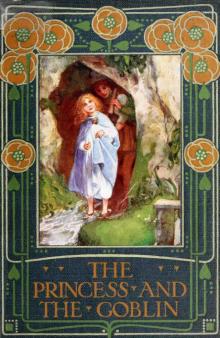 The Princess and the Goblin
The Princess and the Goblin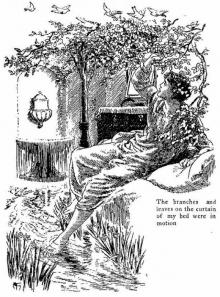 Phantastes: A Faerie Romance for Men and Women
Phantastes: A Faerie Romance for Men and Women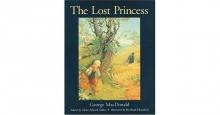 A Double Story
A Double Story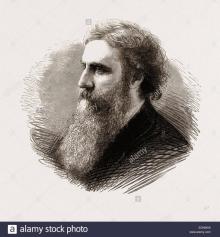 St. George and St. Michael
St. George and St. Michael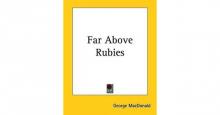 Far Above Rubies
Far Above Rubies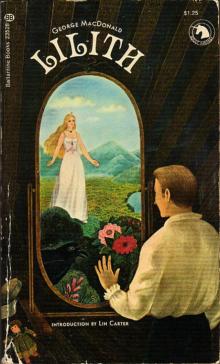 Lilith
Lilith